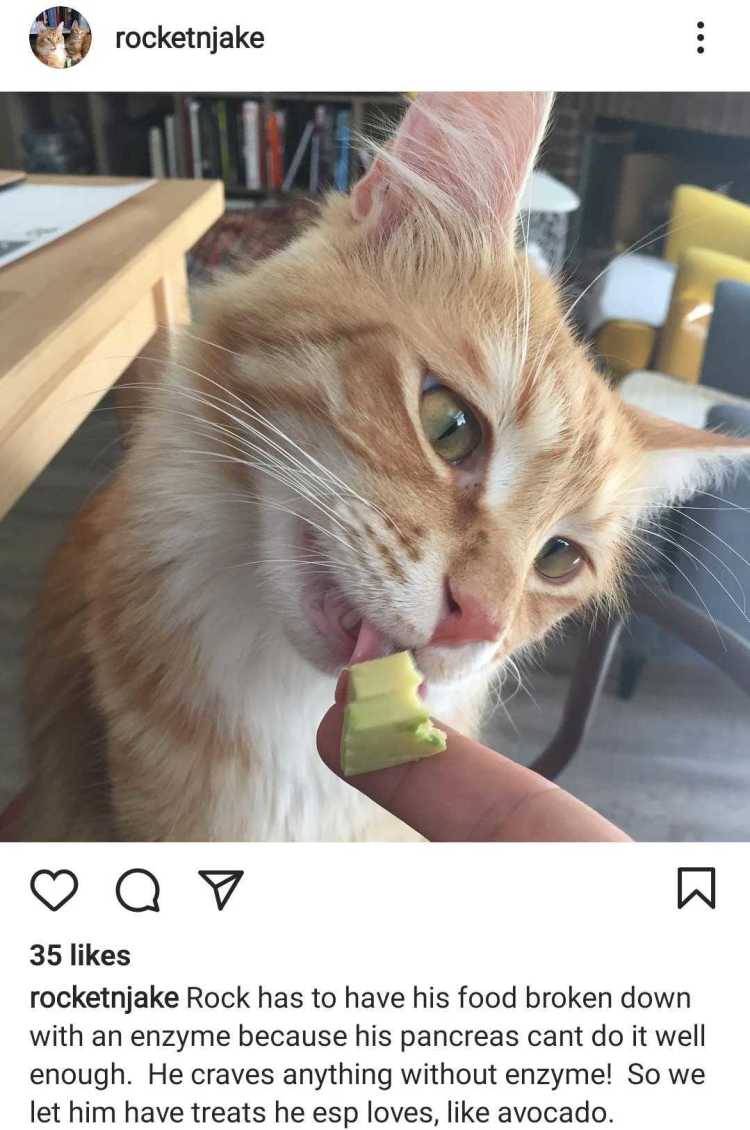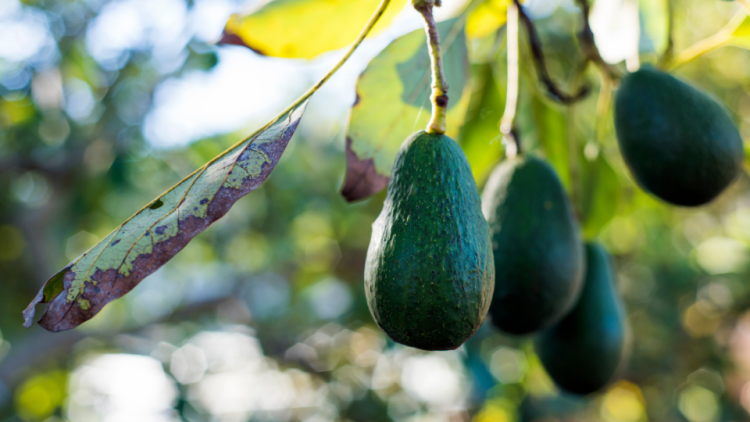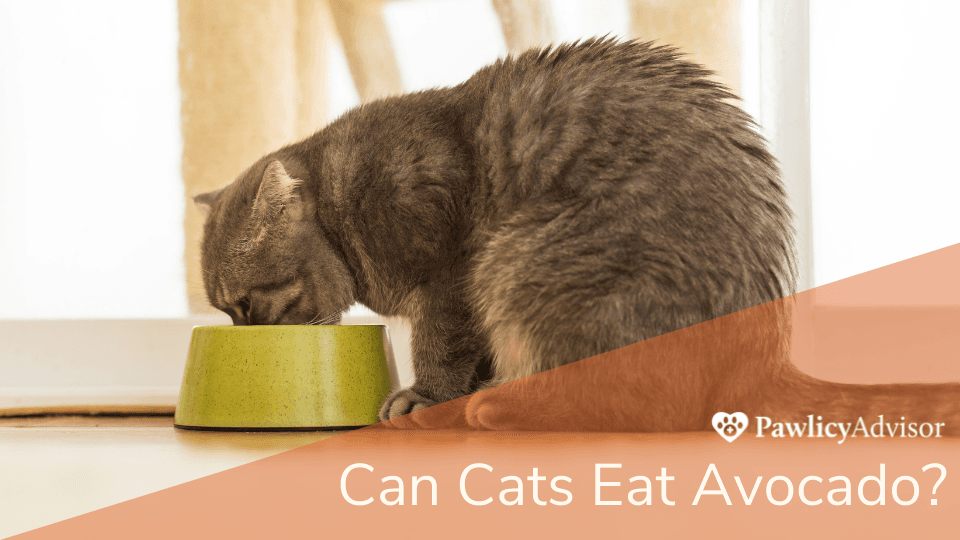Also known as alligator pears due to their green, textured skin, avocados are a powerful superfood in humans. But can cats eat avocados? As we’ll discuss in this article, the answer is not so straightforward. Although cats can safely eat avocado flesh (also called “meat”), other parts of the fruit can be toxic.
Keep reading to learn everything you need to know about how to feed avocado to cats, so you can maximize the nutritional benefits and minimize the health risks.
Table of Contents:
- Can cats eat avocado?
- When are avocados bad for cats?
- How to safely feed avocado to cats
- What to do if your cat eats too much avocado
- Key Takeaways
Pro Tip: Pet insurance can help ease the burden of unexpected vet bills from accidents such as poisoning. It will allow you to focus on getting the best treatment for your cat without worrying about how you will pay for it.
Can cats eat avocado?
Not only can cats eat avocado, but they can also enjoy some of the same health benefits the plant offers to humans. Here are a few reasons why the flesh of an avocado is good for cats:
- Loaded with protein. Avocado contains 18 amino acids, which makes it an excellent source of high-quality protein for cats. Felines are obligate carnivores, so protein is vital for many of their bodily functions. Some examples include muscle development, energy production, immune defense, organ function, and nail growth.
- Contains healthy fats. The fats in avocado are considered “healthy fats," such as oleic acid, an omega fatty acid with a powerful anti-inflammation effect. Nonetheless, they should still be fed in small amounts.
- Packed with antioxidants. Antioxidants fight damage caused by free radicals. Some can also help inhibit the growth of cancerous cells, and the anti-inflammatory properties of avocado can help reduce the side effects of cancer treatments like chemotherapy. Other antioxidants, such as the carotenoids lutein and zeaxanthin, are proven to be very beneficial for the eyes.
- Rich in dietary fiber. Avocados are very rich in fiber, improving the efficiency of the good bacteria found in a feline's intestine and aiding regular bowel movement. Dietary fiber is one of the most effective natural remedies for constipation and can help with weight loss by making your cat feel full for longer. Additionally, fiber can reduce spikes in blood sugar, helping to promote heart health.
- Promotes a healthy heart. The potassium in avocados also benefits cardiovascular because it facilitates several important heart-related functions, such as reducing blood pressure. Unfortunately, heart problems are pretty common in cats and often result from a sedentary lifestyle.
The meat of an avocado is good for cats because it's low in cholesterol and sodium while brimming with essential vitamins and minerals. This list includes vitamins A, C, K, E, B1, B2, B3, B5, and B6, folate, iron, zinc, copper, phosphorus, manganese, and magnesium.

When are avocados bad for cats?
While the avocado flesh is safe for cats to eat, other parts of the fruit can be potentially harmful to your cat.
One area of concern is persin, an organic compound found naturally within the avocado pit, leaves, peel, and stem of the avocado fruit. According to the Pet Poison Helpline, persin rarely affects cats and dogs but can be deadly to birds and large animals. Although the effect is not life-threatening in cats, the toxicity can be potent and result in diarrhea, vomiting, obstruction of stool, and pancreatitis.
Also, note that the avocado skin, pit, leaves, and stem can present a choking hazard to cats. Like many other carnivores, cats tend to gulp their foods down whole, so make sure to keep any avocado discards away from your kitty companion.
Large amounts of avocado can result in diarrhea and other GI issues due to its high-fat content. It may also lead to pancreatitis. Senior cats and cats with chronic health issues might have more sensitive stomachs, which is why you should be especially careful if feeding avocado to them.
Don’t give avocado to cats with a history of pancreatitis or gastritis. Because the fruit is high in fat, it could give your cat an upset stomach or increase the risk of pancreatic inflammation returning for pets with these preexisting conditions.
Can cats eat avocado oil?
Yes, cats can safely eat small amounts of avocado oil. Avocado oil has almost the same benefits as avocado flesh and is readily absorbed into your pet’s system. Another upside is that avocado oil contains lower levels of persin. However, it can be high in fat, so it should only be given in minimal amounts.
You should check with your veterinarian before giving it to your cat. They may recommend avocado oil for topical application to improve your pet’s fur and coat. Just make sure that the oil is pure and without any additives.
Can cats eat guacamole?
Guacamole is not safe for cats because it often contains ingredients like onion and garlic, which are toxic to cats. Guacamole can also contain lemon juice and tomatoes, which can cause damage to animals' stomach and heart.
Can kittens eat avocado?
While avocado flesh is non-toxic to cats, it’s best not to give it to kittens because their immune systems are less developed, and their stomachs are much more sensitive. Be especially careful to properly discard the avocado seed, peels, stems, and leaves. They may contain toxic chemicals that could have significant adverse effects on small kittens. The choking risks are also higher in kittens than in adult felines.
How to safely feed avocado to cats
If you decide to give your cat avocado, remember these feeding tips:
- Always peel the avocado skin, remove the pit, and cut the flesh of the fruit into small pieces. Then, you can feed it to them directly or sprinkle the avocado pieces in cat food with their usual meal.
- As with all human foods, you should only offer cats avocado in small amounts - about 15 grams (one tablespoon) should be enough depending on their weight. Ask your vet for their recommended serving size.
- If you have an outdoor cat and grow avocado trees in your yard, be sure to keep them away from the plant. These can be harmful to pets due to the higher persin concentration in the bark and leaves.

What to do if your cat eats too much avocado
If you ever notice anything out of the ordinary after a cat eats avocado, call your vet or the Pet Poison Helpline at (855)764-7661. Signs of toxicosis (food poisoning) in cats include:
- Swelling
- Vomiting
- Diarrhea
- Coughing
- Difficulty swallowing
- Difficulty breathing
- Fever
- Increased heart rate
- Abdominal pain
A veterinarian or the helpline staff will instruct you how best to help your pet.
Pro Tip: If a cat eats too much avocado or swallows ‘forbidden’ parts of the fruit, a pet insurance plan could prove very valuable for enrolled pets. Depending on the policy, pet parents can get reimbursed for up to 100% of the cost of medical treatments.
Key Takeaways
- Avocados are generally safe for cats as long as they’re fed in small amounts.
- Don’t feed your cat peels and pit as they can present a serious choking hazard. These parts also contain persin, a substance that can be toxic to cats.
- Be sure to keep the avocado discards safely away from your pet, and always call your veterinarian with questions and concerns.
